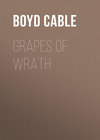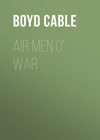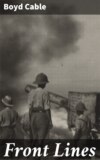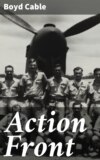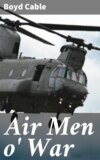Read the book: «Grapes of wrath», page 3
“’Ear, ’ear!” said Pug. “Any’ow, if any of us stops one, but isn’t a complete wash-out, the others can lug ’im into any shell ’ole that’s ’andy, and leave ’im there.”
“We’ll call that a bargain,” said Kentucky briefly. They sat fidgeting for a few seconds longer, hearing the rush and crash of the falling shells, the whistle and smack of the bullets on the open ground beyond them.
“I’m going to have a peep,” said Larry suddenly, “just to see how ‘A’ is getting on.”
He stood on the fire step, with his head stooped cautiously below the level of the parapet; then, raising it sharply, took one long, sweeping glance, and dropped down again beside his fellows.
“They’re nearly over,” he said. “There’s a lot of smoke about, and I can’t see very clear, but the line doesn’t look as if it had been very badly knocked about.”
“There goes ‘B,’” said Billy Simson, as they heard the shrill trill of a whistle. “Our turn next!”
“That open ground is not such a healthy resort as we thought it a few minutes ago,” said Larry. “Personally, I sha’n’t be sorry when we’re across it.”
He spoke in what he strove to make an easy and natural voice, but somehow he felt that it was so strained and unnatural that the others would surely notice it. He felt horribly ashamed of that touch of faintness and sickness back in the communication trench, and began to wonder nervously whether the others would think he was a coward, and funking it; still worse, began to wonder whether actually they would be right in so thinking. He began to have serious doubts of the matter himself, but, if he had known it, the others were feeling probably quite as uncomfortable as himself, except possibly Pug, who had long since resigned himself to the comforting fatalism that if his name were written on the bullet it would find him. If not, he was safe.
None of the four looked to see how “B” Company progressed. They were all beginning to feel that they would have to take plenty of chances when it came their turn to climb the parapet, and that it was folly to take an extra risk by exposing themselves for a moment before they need.
A shout came from the traverse next to them.
“Get ready, ‘C’ Company; pass the word!”
The four stood up, and Larry lifted his voice, and shouted on to the next traverse.
“Get ready, ‘C’; pass the word!”
“Don’t linger none on the parapet, boys,” said Kentucky. “They’ve probably got their machine gun trained on it.”
The next instant they heard the blast of a whistle, and a shout rang along the line.
“Come on, ‘C’; over with you!”
The four leaped over the parapet, scrambling and scuffling up its broken sides.
Near the top Pug exclaimed suddenly, grasped wildly at nothing, collapsed and rolled backward into the trench. The other three half-halted, and looked round.
“Come on,” said Kentucky; “he’s safest where he is, whether he’s hurt much or little.”
The three picked their way together out through the remains of the old barbed-wire entanglements, and began to run across.
“Open out! Open out!” the officers were shouting, and a little reluctantly, for the close elbow-touching proximity to each other gave a comforting sense of helpfulness and confidence, they swerved a yard or two apart, and ran on steadily. The bare two hundred yards seemed to stretch to a journey without end; the few minutes they took in crossing spun out like long hours.
Several times the three dropped on their faces, as they heard the warning rush of a shell. Once they half-fell, were half-thrown down by the force of an explosion within twenty yards of them. They rose untouched, by some miracle, and, gasping incoherent inquiries to one another, went on again. Over and over again fragments from the shells bursting above the line rattled down upon the ground amongst their feet. At least two or three times a shell bursting on the ground spattered them with dust and crumbs of earth; the whole way across they were accompanied by the drumming bullets that flicked and spurted little clouds of dust from the ground about them, and all the time they were in the open they were fearfully conscious of the medley of whining and singing and hissing and zipping sounds of the passing bullets. They knew nothing of how the rest of the line was faring. They were too taken up with their own part, were too engrossed in picking a way over the broken shell-cratered ground, past the still khaki forms that lay dotted and sprawled the whole way across.
There was such a constant hail and stream of bullets, such a succession of rushing shells, of crashing explosions, such a wild chaos of sounds and blinding smoke and choking reek, that the whole thing was like a dreadful nightmare; but the three came at last, and unharmed, to the chopped and torn-up fragments of the old German wired defenses, tore through them somehow or anyhow, leaped and fell over the smashed-in parapet, and dropped panting and exhausted in the wrecked remains of the German trench. It was some minutes before they took thought and breath, but then it was evident that the minds of all ran in the same groove.
“I wonder,” said Larry, “if Pug was badly hit?”
“I’ve no idea,” said Kentucky. “He went down before I could turn for a glimpse of him.”
“I don’t suppose it matters much,” said Billy Simson gloomily. “He’s no worse off than the rest of us are likely to be before we’re out of this. Seems to me, by the row that’s goin’ on over there, this show is gettin’ hotter instead of slackin’ off.”
CHAPTER V
ON CAPTURED GROUND
“I wonder what the next move is?” said Larry. “I don’t fancy they will leave us waiting here much longer.”
“Don’t you suppose,” asked Kentucky, “we’ll wait here until the other companies get across?”
“Lord knows,” said Larry; “and, come to think of it, Kentuck, has it struck you how beastly little we do know about anything? We’ve pushed their line in a bit, evidently, but how far we’ve not an idea. We don’t know even if their first line is captured on a front of half a mile, or half a hundred miles; we don’t know what casualties we’ve got in our own battalion, or even in our own company, much less whether they have been heavy or light in the whole attack.”
“That’s so,” said Kentucky; “although I confess none of these things is worrying me much. I’m much more concerned about poor old Pug being knocked out than I’d be about our losing fifty per cent. of half a dozen regiments.”
Billy Simson had taken the cork from his water-bottle, and, after shaking it lightly, reluctantly replaced the cork, and swore violently.
“I’ve hardly a mouthful left,” he said. “I’m as dry as a bone now, and the Lord only knows when we’ll get a chance of filling our water-bottles again.”
“Here you are,” said Larry; “you can have a mouthful of mine; I’ve hardly touched it yet.”
Orders came down presently to close in to the right, and in obedience the three picked up their rifles and crept along the trench. It was not a pleasant journey. The trench had been very badly knocked about by the British bombardment; its sides were broken in, half or wholly filling the trench; in parts it was obliterated and lost in a jumble of shell craters; ground or trench was littered with burst sandbags, splintered planks and broken fascines, and every now and again the three had to step over or past bodies of dead men lying huddled alone or in groups of anything up to half a dozen. There were a few khaki forms amongst these dead, but most were in the German gray, and most had been killed very obviously and horribly by shell or bomb or grenade.
“They don’t seem to have had many men holding this front line,” remarked Larry, “or a good few must have bolted or surrendered. Doesn’t seem as if the little lot here could have done much to hold the trench.”
“Few men and a lot of machine guns, as usual, I expect,” said Kentucky. “And if this is all the trench held they claimed a good bunch of ours for every one of theirs, if you judge by the crowd of our lot lying out there in the open.”
The three were curiously unmoved by the sight of these dead – and dead, be it noted, who have been killed by shell fire or bomb explosions might as a rule be expected to be a sight upsetting to the strongest nerves. They were all slightly and somewhat casually interested in noting the mode and manner of death of the different men, and the suspicion of professional jealousy evinced by a remark of Billy Simson’s was no doubt more or less felt by all, and all were a little disappointed that there was not more evidence of the bayonet having done its share. “The bloomin’ guns seem to have mopped most o’ this lot,” said Billy. “An’ them fellers that charged didn’t find many to get their own back on.” They were all interested, too, in the amount of damage done by the shells to the trench, in the methods of trench construction, in the positions and state of the dug-outs. And yet all these interests were to a great extent of quite a secondary nature, and the main theme of their thoughts was the bullets whistling over them, the rush and crump and crash of the shells still falling out on the open, the singing and whirring of their splinters above the trench. They moved with heads stooped and bodies half-crouched, they hurried over the earth heaps that blocked the trench, and in crossings where they were more exposed, halted and crouched still lower under cover when the louder and rising roar of a shell’s approach gave warning that it was falling near.
When they had moved up enough to be in close touch with the rest of the company and halted there, they found themselves in a portion of trench with a dug-out entrance in it. The entrance was almost closed by a fall of earth, brought down apparently by a bursting shell, and when they arrived they found some of the other men of the company busy clearing the entrance. “Might be some soo-veniers down ’ere,” one of the men explained. “An’, any’ow, we’d be better down below an’ safer out o’ reach o’ any shell that flops in while we’re ’ere,” said another.
“Suppose there’s some bloomin’ ’Uns still there, lyin’ doggo,” suggested Billy Simson. “They might plunk a shot at yer when you goes down.”
“Shouldn’t think that’s likely,” said Larry. “They would know that if they did they’d get wiped out pretty quick after.”
“I dunno,” said one of the men. “They say their officers an’ their noospapers ’as ’em stuffed so full o’ fairy tales about us killing all prisoners that they thinks they’re goin’ to get done in anyhow, an’ might as well make a last kick for it. I vote we chuck a couple o’ bombs down first, just to make sure.”
Everybody appeared to think this a most natural precaution to take, and a proposal in no way cruel or brutal; although, on the other hand, when Larry, with some feeling that it was an unsporting arrangement, suggested that they call down first and give any German there a chance to surrender, everybody quite willingly accepted the suggestion. So work was stopped, and all waited and listened while Larry stuck his head into the dark opening and shouted with as inquiring a note as he could put into his voice the only intelligible German he knew, “Hi, Allemands, kamerad?” There was no answer, and he withdrew his head. “I don’t hear anything,” he said; “but perhaps they wouldn’t understand what I meant. I’ll just try them again in French and English.” He poked his head in again, and shouted down first in French and then in English, asking if there was anybody there, and did they surrender. He wound up with a repetition of his inquiring, “Kamerad, eh? kamerad?” but this time withdrew his head hurriedly, as an unmistakable answer came up to him, a muffled, faraway sounding “Kamerad.” “There’s some of them there, after all,” he said, excitedly, “and they’re shouting ’Kamerad,’ so I suppose they want to surrender all right. Let’s clear away enough of this to get them out. We’ll make ’em come one at a time with their hands well up.”
There was great excitement in the trench, and this rather increased when a man pushed round the traverse from the next section with the news that some Germans had been found in another dugout there. “They’re singin’ out that they want to kamerad,” he said; “but we can’t persuade ’em to come out, an’ nobody is very keen on goin’ down the ’ole after ’em. We’ve passed the word along for an officer to come an’ see what ’e can do with ’em.”
“Let’s hurry up and get our gang out,” said Larry enthusiastically, “before the officer comes”; and the men set to work with a will to clear the dugout entrance. “It’s rather a score for the Stonewalls to bring in a bunch of prisoners,” said one of the men. “We ought to search all these dugouts. If there’s some in a couple of these holes it’s a fair bet that there’s more in the others. Wonder how they haven’t been found by the lot that took the trench?”
“Didn’t have time to look through all the dugouts, I suppose,” said Larry. “And these chaps would lie low, thinking the trench might be retaken. I think that hole is about big enough for them to crawl out. Listen! They’re shouting ‘Kamerad’ again. Can’t you hear ’em?”
He looked down the dark stairway of the entrance and shouted “Kamerad” again, and listened for the reply. “I wonder if the door is blocked further down,” he said. “I can hear them shout, but the sound seems to be blocked as if there was something between us and them still. Listen again.”
This time they all heard a faint shout, “Kamerad. Hier kom. Kamerad.”
“Hier kom – that means come here, I fancy,” said Larry. “But why don’t they hier kom to us? Perhaps it is that they’re buried in somehow and want us to get them out. Look here, I’m going to crawl down these steps and find out what’s up.”
He proceeded to creep cautiously down the low and narrow passage of the stair, when suddenly he saw at the stair foot the wandering flash of an electric torch and heard voices calling plainly in English to “Come out, Bochie. Kamerad.”
The truth flashed on Larry, and he turned and scuttled back up the stair gurgling laughter. “It’s some of our own lot down there,” he chuckled to the others. “This dug-out must have another entrance in the next traverse, and we and the fellows round there have been shouting down the two entrances at each other. Hold on now and listen and hear them scatter.” He leaned in at the entrance again, and shouted loudly. “As you won’t come out and surrender, Boche, we’re going to throw some bombs down on you.” He picked up a heavy stone from the trench bottom and flung it down the steps. There was a moment of petrified silence, then a yell and a scuffling rush of footsteps from the darkness below, while Larry and the others sat and rocked with laughter above. They pushed round the traverse just as a couple of badly scared and wholly amazed Stonewalls scrambled up from the dug-out, and commenced a voluble explanation that “the blighters is chuckin’ bombs, … told us in English, good plain English, too, they was goin’ to ’cos we wouldn’t surrender.”
Just then an officer pushed his way along to them, and the joke was explained with great glee by Larry and the men from the other part of the trench. Every one thought it a huge joke, and laughed and cracked jests, and chuckled over the episode. Kentucky listened to them with some wonder. He had thought that in the past months of peace and war he had come to know and understand these comrades of his fairly well. And yet here was a new side in their many-sided characters that once more amazed him. A couple of dead Germans sprawled in the bottom of the trench a yard or two from them; their own dead lay crowded thick on the flat above; the bullets and shells continued to moan and howl overhead, to rush and crash down close by, the bullets to pipe and whistle and hiss past and over; while only a few hundred yards away the enemy still fought desperately to hold their lines against our attacks, and all the din of battle rolled and reverberated unceasingly. And yet the men in that trench laughed and joked. They knew not the moment when one of those shells falling so close outside might smash into the trench amongst them, knew that all of those there would presently be deep in the heart of the battle and slaughter that raged so close to them, knew for a certainty that some of them would never come out of it; and yet – they laughed. Is it any wonder that Kentucky was amazed?
And they continued to chuckle and poke fun at the two who had been the butt of the jest and had run from the flung stone, continued even as they began to move slowly along the ruined trench that led towards the din of the fighting front lines.
CHAPTER VI
TAKING PUNISHMENT
“C” Company of the Stonewalls progressed slowly for some distance up the communication trench, with the whistling of bullets growing faster the nearer they approached to the firing line. This trench too had been badly damaged previous to the attack by the British artillery, and the cover it afforded to the crawling line of men was frequently scanty, and at times was almost nil. There were one or two casualties from chance bullets as men crawled over the débris of wrecked portions of the trench, but the line at last reached what had been one of the German support trenches, and spread along it, without serious loss.
This trench had been reversed by our Engineers, that is to say, the sandbags and parapet on what had been its face, looking towards the British line, had been pulled down and re-piled on the new front of the trench, which now looked towards the ground still held by the Germans. The trench was only some three to four hundred yards behind what was here the most advanced British line, the line from which some of our regiments were attacking, and in which they were being attacked. Practically speaking, therefore, the Stonewalls knew their position was well up on the outer fringe of the infantry fighting, and through it swirled constantly eddies from the firing line in the shape of wounded men and stretcher-bearers, and trickling but constantly running streams of feeders to the fighting – ammunition carriers, staggering under the weight of ammunition boxes and consignments of bombs and grenades; regimental stretcher-bearers returning for fresh loads; ration parties carrying up food and water. There were still communication trenches leading from the Stonewalls’ position to the firing line, but because these had been and still were made a regular target by the German guns, had been smashed and broken in beyond all real semblance of cover or protection, and brought their users almost with certainty under the bursting shrapnel or high explosive with which the trench was plastered, most of the men going up or coming back from the forward trench, and especially if they were laden with any burden, preferred to take their chance and make the quicker and straighter passage over the open ground.
The daylight was beginning to fade by now, the earlier because dark clouds had been massing, and a thin misty drizzle of rain had begun to fall; but although it was dusk there was no lack of light in the fighting zone. From both the opposing trenches soaring lights hissed upwards with trailing streams of sparks, curved over, burst into vivid balls of brilliant light, and floated slowly and slantingly downwards to the ground.
The Stonewalls could see – if they cared to look over their parapet – this constant succession of leaping, soaring, and sinking lights, the dancing black shadows they threw, and the winking spurts of fiery orange flame from the rifle muzzles and from the bursting grenades, while every now and again a shell dropped with a blinding flash on or behind one or other of the opposing parapets. There were not many of the Stonewalls who cared to lift their heads long enough to watch the blazing display and the flickering lights and shadows. The position of their trench was slightly higher than the front line held by the Germans, and as a result there was always a hissing and whizzing of bullets passing close overhead, a smacking and slapping of others into their parapet and the ground before it; to raise a head above the parapet was, as the men would have said, “Askin’ for it,” and none of them was inclined needlessly to do this. But the other men who passed to and fro across their trench, although they no doubt liked their exposure as little as the Stonewalls did, climbed with apparent or assumed indifference over the parapet and hurried stooping across the open to the next trench, or walked back carefully and deliberately, bearing the stretcher laden with the wounded, or helping and supporting the casualties who were still able in any degree to move themselves.
The Stonewalls were given no indication of the time they were to remain there, of when or if they were to be pushed up into the forward trench. The thin rain grew closer and heavier, a chill wind began to blow, setting the men shivering and stamping their feet in a vain attempt to induce warmth. Some of them produced food from their haversacks and ate; almost all of them squatted with rounded shoulders and stooping heads and smoked cigarettes with hands curved about them to hold off the rain, or pipes lit and turned upside down to keep the tobacco dry. They waited there for hours, and gradually, although the sounds of fighting never ceased on their front, the rolling thunder that had marked the conflict during the day died down considerably as the night wore on, until it became no more than a splutter and crackle of rifle fire, a whirring and clattering outburst from some distant or near machine gun, the whoop and rush and jarring burst of an occasional shell on the British or German lines.
At intervals the fight flamed upward into a renewed activity, the rifle fire rose rolling and drumming, the machine guns chattered in a frenzy of haste; the reports of the bursting bombs and grenades followed quickly and more quickly upon each other. Invariably the louder outburst of noise roused the guns on both sides to renewed action. The sky on both sides winked and flamed with flashes that came and went, and lit and darkened across the sky, like the flickering dance of summer lightning. The air above the trenches shook again to the rush of the shells; the ground about and between the front lines blazed with the flashes of the bursts, was darkened and obscured by the billowing clouds of smoke and the drifting haze of their dissolving. Invariably, too, the onslaught of the guns, the pattering hail of their shrapnel, the earth-shaking crash of the high explosives, reduced almost to silence the other sounds of fighting, drove the riflemen and bomb-throwers to cover, and so slackened off for a space the fierceness of the conflict.
To the Stonewalls the night dragged with bitter and appalling slowness; they were cramped and uncomfortable; they were wet and cold and miserable. The sides of the trench, the ground on which they sat, or lay, or squatted, turned to slimy and sticky mud, mud that appeared to cling and hold clammily and unpleasantly to everything about them, their boots and puttees, the skirts of their coats, their packs and haversacks, their hands and rifles and bayonets, and even to their rain-wet faces.
Long before the dawn most of the men were openly praying that they would soon be pushed up into the front rank of the fighting, not because they had any longing or liking for the fight itself, not that they had – any more than any average soldier has – a wish to die or to take their risks, their heavy risks, of death or wounds, but simply because they were chilled to the bone with inaction, were wholly and utterly and miserably wet and uncomfortable, were anxious to go on and get it over, knowing that when they had been in the front line for a certain time, had been actively fighting for so long, and lost a percentage of their number in casualties, they would be relieved by other regiments, would be withdrawn, and sent back to the rear. That sending back might mean no more than a retirement of a mile or two from the front trench, the occupation of some other trench or ditch, no less wet and uncomfortable than the one they were in; but, on the other hand, it might mean their going back far enough to bring them again into touch with the broken villages in the rear, with houses shattered no doubt by shell fire but still capable of providing rough and ready-made shelter from the rain, and, a boon above all boons, wood for fires, with crackling, leaping, life-giving flames and warmth, with the opportunity of boiling mess-tins of water, of heating tinned rations, and of making scalding hot tea.
There might be much to go through before such a heaven could be reached. There were certainly more long hours in the hell of the forward line, there was black death and burning pain, and limb and body mutilation for anything up to three-fourths of their number, to be faced. There were sleeting rifle bullets, and hailing storms from the machine guns, shattering bombs and grenades, rending and tearing shrapnel and shell splinters, the cold-blooded creeping murder of a gas attack perhaps; the more human heat and stir of a bayonet charge; but all were willing, nay, more, all would have welcomed the immediate facing of the risks and dangers, would have gladly taken the chance to go on and get it over, and get back again – such of them as were left – to where they could walk about on firm ground, and stretch their limbs and bodies to sleep in comparative dryness. But no order came throughout the night, and they lay and crouched there with the rain still beating down, with the trench getting wetter and muddier and slimier about them, with their bodies getting more numbed, and their clothing more saturated; lay there until the cold gray of the dawn began to creep into the sky, and they roused themselves stiffly, and with many groans, to meet what the new day might bring forth to them.
The day promised to open badly for the Stonewalls. As the light grew, and became sufficiently strong for the observation of artillery fire, the guns recommenced a regular bombardment on both sides. From the first it was plain that the support trench occupied by the Stonewalls had been marked down as a target by the German gunners. The first couple of shells dropped on the ground behind their trench and within fifty yards of it, sending some shrieking fragments flying over their heads, spattering them with the mud and earth outflung by the explosions. Another and then another fell, this time in front of their trench, and then one after another, at regular intervals of two to three minutes, a heavy high explosive crashed down within a yard or two of either side of the trench, breaking down the crumbling sides, blowing in the tottering parapet, half-burying some of the men in a tumbling slide of loose, wet earth and débris; or falling fairly and squarely in the trench itself, killing or wounding every man in the particular section in which it fell, blasting out in a fountain of flying earth and stones and mud the whole front and back wall of the trench, leaving it open and unprotected to the searching shrapnel that burst overhead and pelted down in gusts along the trench’s length.
The Stonewalls lay and suffered their cruel punishment for a couple of hours, and in that time lost nearly two hundred men, many of them killed, many more of them so cruelly wounded they might almost be called better dead; lost their two hundred men without stirring from the trench, without being able to lift a finger in their own defense, without even the grim satisfaction of firing a shot, or throwing a bomb, or doing anything to take toll from the men who were punishing them so mercilessly for those long hours.
Larry, Kentucky, and Simson lay still, and crouched close to the bottom of the trench, saying little, and that little no more than expressions of anger, of railing against their inaction, of cursings at their impotence, of wondering how long they were to stick there, of how much longer they could expect to escape those riving shells, that pounded up and down along the trench, that sent shiverings and tremblings through the wet ground under them, that spat at them time and again with earth and mud and flying clods and stones. In those two hours they heard the cries and groans that followed so many times the rending crash and roar of the shell’s explosion on or about the trench; the savage whistling rush and crack of the shrapnel above them, the rip and thud of the bullets across trench and parapet. They saw many wounded helped and many more carried out past them to the communication trench that led back to the rear and to the dressing-stations. For all through the two hours, heedless of the storm of high explosive that shook and battered the trench to pieces, the stretcher-bearers worked, and picked up the casualties, and sorted out the dead and the dying from the wounded, and applied hasty but always neat bandages and first field-dressings, and started off those that could walk upon their way, or laid those who were past walking upon their stretchers and bore them, staggering and slipping and stumbling, along the muddy trench into the way towards the rear.
“I wonder,” said Larry savagely, “how much longer we’re going to stick here getting pounded to pieces. There won’t be any of the battalion left if we’re kept here much longer.”
“The front line there has been sticking longer than us, boy,” said Kentucky, “and I don’t suppose they’re having any softer time than us.”
“I believe it’s all this crowd trampin’ in an’ out of our trench that’s drawin’ the fire. They ought to be stopped,” said Billy Simson indignantly. “Here’s some more of ’em now… Hi, you! Whatjer want to come crawlin’ through this way for? Ain’t there any other way but trampin’ in an’ out on top of us ’ere?”
The couple of mud-bedaubed privates who had slid down into the trench and were hoisting an ammunition-box on to the parapet stopped and looked down on Billy crouching in the trench bottom. “Go’n put yer ’ead in a bag,” said one coarsely. “Of course, if you says so, me lord dook,” said the other with heavily sarcastic politeness, “we’ll tell the C.O. up front that you objects to us walkin’ in your back door an’ out the front parlor; an’ he must do without any more ammunition ’cos you don’t like us passing through this way without wipin’ our feet on the mat.”
